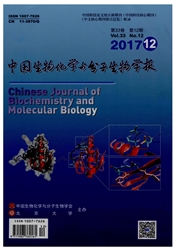

 中文摘要:
中文摘要:
免疫抑制剂cyclosporin A和FK-506通过抑制依赖钙调蛋白的磷酸酶calcineurin(CaN)的活性,阻断了活化T细胞核因子(NFAT)的活化,最终抑制了机体的免疫应答.然而,这种直接对CaN酶活性的破坏,使得这类药物具有严重的临床毒副作用.随着对NFAT调节机制的研究深入,近年来,人们运用各种试验方法、手段筛选了一些天然的以及合成的抑制剂,它们针对NFAT信号通路的下游靶点发挥作用,从而选择性更强,毒性更小,为临床抗移植排斥反应、自身免疫性疾病的治疗奠定了基础.本文综述了这方面的进展,并就这些抑制剂的特点进行了简单的分析,另提出了一些新的有治疗潜力的靶点.
 英文摘要:
英文摘要:
The NFAT(nuclear factor of activated T) family members of transcription factors play central roles in the immune system. Their activation processes have been targeted for the immunosuppressive drugs like cyclosporine A and FK-506, which bind to their correspondent intracellular receptors cyclophilin A and FKBP12, to inhibit the phosphatase activity of CaN and the nuclear localization of NFAT proteins, thus prevent immune response. Although the clinical administration of these drugs seemed to be effective, these classic immunosuppressants intervene calcineurin activity and lead to severe side effects. Recently, studies of the NFAT signaling have revealed a number of natural and synthetic immunosuppressive agents, which targeted to NFAT downstream signal transduction pathways, to be more selective and less toxic. This review focuses on the advances in these immunosuppressive agents and the analysis of their characteristics. We will also present the detailed structures of NFAT and predict some potential targets of novel therapeutics for post transplant rejection and autoimmune diseases.
 同期刊论文项目
同期刊论文项目
 同项目期刊论文
同项目期刊论文
 The bla(CTX-M-1) gene located in a novel complex class I integron bearing an ISCR1 element in Escher
The bla(CTX-M-1) gene located in a novel complex class I integron bearing an ISCR1 element in Escher Increased CD4(+)CD25(+)FOXP3(+) regulatory T cells in cancer patients from conversion of CD4(+)CD25(
Increased CD4(+)CD25(+)FOXP3(+) regulatory T cells in cancer patients from conversion of CD4(+)CD25( 期刊信息
期刊信息
